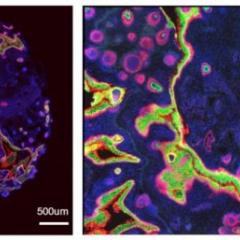 A Queensland medical researcher who is on the trail of genetic markers for rheumatoid arthritis and tuberculosis has won the state's top science prize.
A Queensland medical researcher who is on the trail of genetic markers for rheumatoid arthritis and tuberculosis has won the state's top science prize.
Professor Matthew Brown from The University of Queensland Diamantina Institute was today awarded the $1.25 million Premier's Science Fellowship to develop his work in the diagnosis and treatment of these common but baffling diseases.
UQ will match the state funding dollar for dollar, to further support Professor Brown's research.
“Rheumatoid arthritis affects 2.5 per cent of Queenslanders and more than 513,000 Australians,” Professor Brown said. “There are no treatments to prevent it, or to induce remission.”
Tuberculosis remained a rising concern around the world.
“In Queensland, we are seeing a rise in cases of multidrug-resistant TB arriving from Papua New Guinea and the Torres Strait islands,” he said. “Because of the lack of useful treatments, the disease is often fatal.”
Although rheumatoid arthritis is an autoimmune disease and TB a chronic infection, Professor Brown said the two shared susceptibility factors, so research into the diseases was related.
“Immunity against TB is highly heritable so a person's genetic makeup is a significant determinant of whether they develop or clear the infection,” he said.
Professor Brown said the fellowship funding would enable his Translational Research Institute team — working in a tri-nation partnership with researchers from China and Norway — to spend the next five years identifying genes that underlie the causes of rheumatoid arthritis and tuberculosis.
“The techniques we are developing have real commercial possibilities and healthcare benefits,” Professor Brown said.
“We expect to roll out affordable diagnostic tests within five years, paving the way for new treatments targeting the root cause of the diseases.”
Winning the fellowship was “a great honour”, he said.
Premier Campbell Newman congratulated Professor Brown on his groundbreaking work, and thanked him for the remarkable quality of his research, which had helped position Queensland as a global leader in genetic research and diagnostic testing.
“This fellowship will allow Professor Brown to advance his gene-mapping research in ways that will benefit Queensland industry and our health,” Mr Newman said.
In the past, Professor Brown has taken out three patents for tests to diagnose ankylosing spondylitis — a severe type of arthritis affecting more than 80,000 Australians — and his genetic findings on that have led to treatment trials.
UQ's President and Vice-Chancellor, Professor Peter Høj, congratulated Professor Brown and thanked the Queensland Government for continuing to support “one of Australia's largest publicly funded research fellowships”.
“UQ is delighted to match the funding,” Professor Høj said. “It is fantastic that the government sees the potential of Matt's highly sophisticated work to address prevalent global diseases.”
Professor Ian Frazer, a past recipient of the fellowship and the TRI chief executive and research director, said the head of China's TB public health program was one of Professor Brown's research collaborators.
“Matt is a researcher of the highest calibre and his project will strengthen scientific links between Australia, China and Norway,” Professor Frazer said.
“Undoubtedly, such multinational research networks have the potential to make fundamental, serious inroads into diseases affecting Australians and people worldwide.”
“Matt's work is a key example of how partnering between clinicians, scientists, academic institutes and industry can achieve optimum outcomes and contribution to the Queensland economy,” Professor Frazer said.
Professor Brown is the fifth UQ researcher to have won the Premier's Science Fellowship. The others are Professor Frazer (2006, cancer and immunology research), Professor Mandyam Srinivasan (2007, bee-inspired robotics) from the Queensland Brain Institute, Professor Ove Hoegh-Guldberg, director of the UQ Global Change Institute (2008, impact of climate change on the Great Barrier Reef) and Professor Anton Middelberg (2010, rapid vaccine development) from the Australian Institute of Bioengineering and Nanotechnology.
Contact: Caroline Davy, UQ Diamantina Institute, ph +61 7 3443 7027, +61 (0) 431 658 934. Professor Matt Brown, ph +61 7 3443 7018.
Fiona Cameron, UQ Communications, ph +61 7 3346 7086, communications@uq.edu.au



